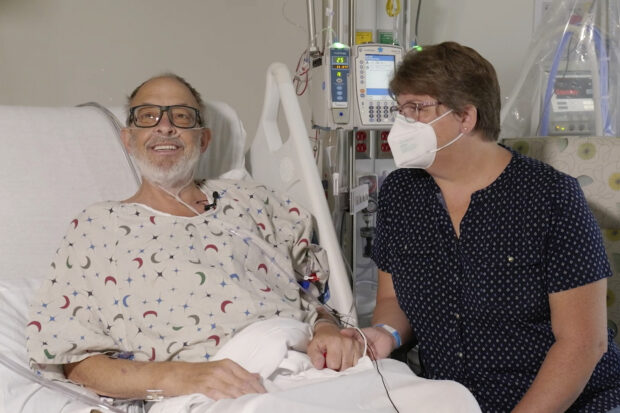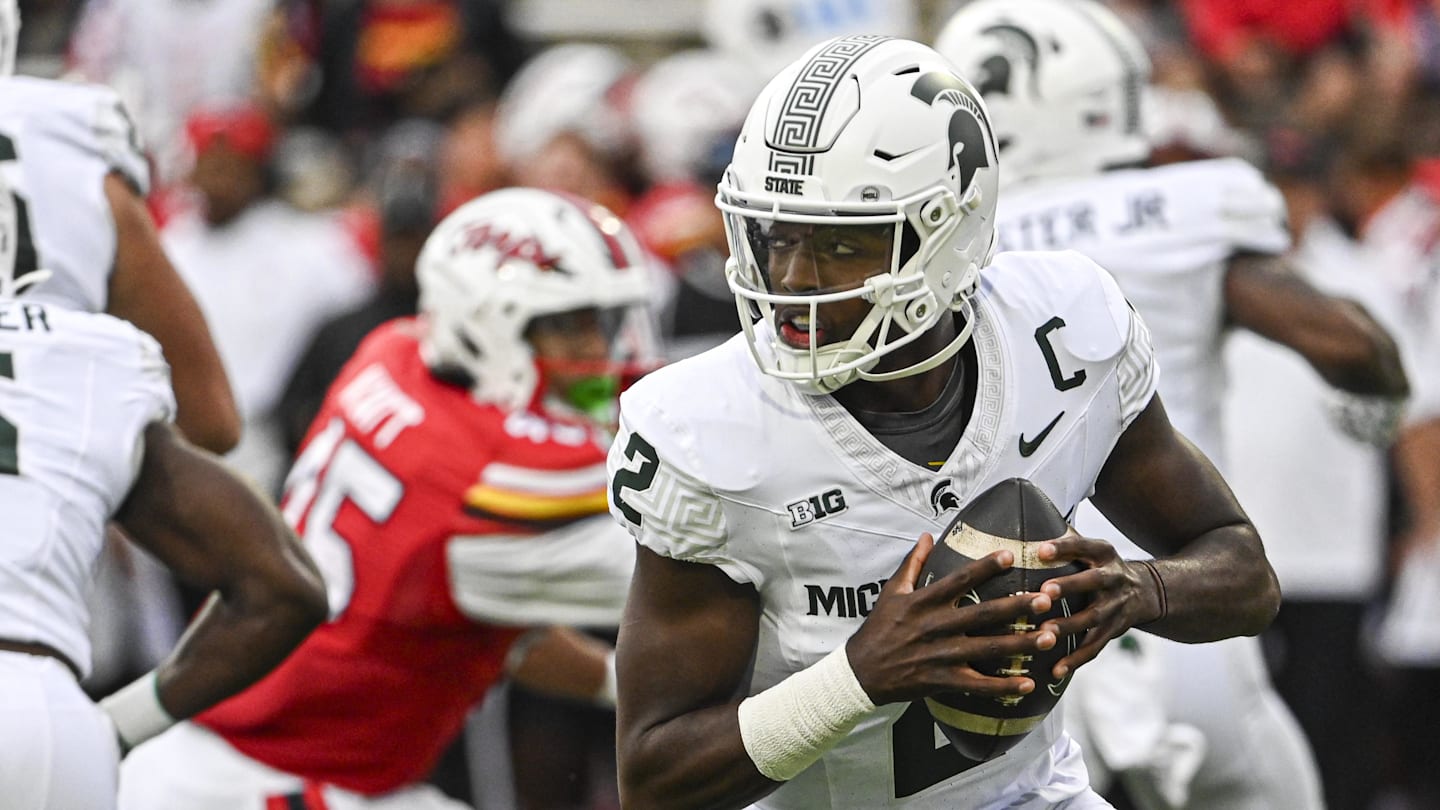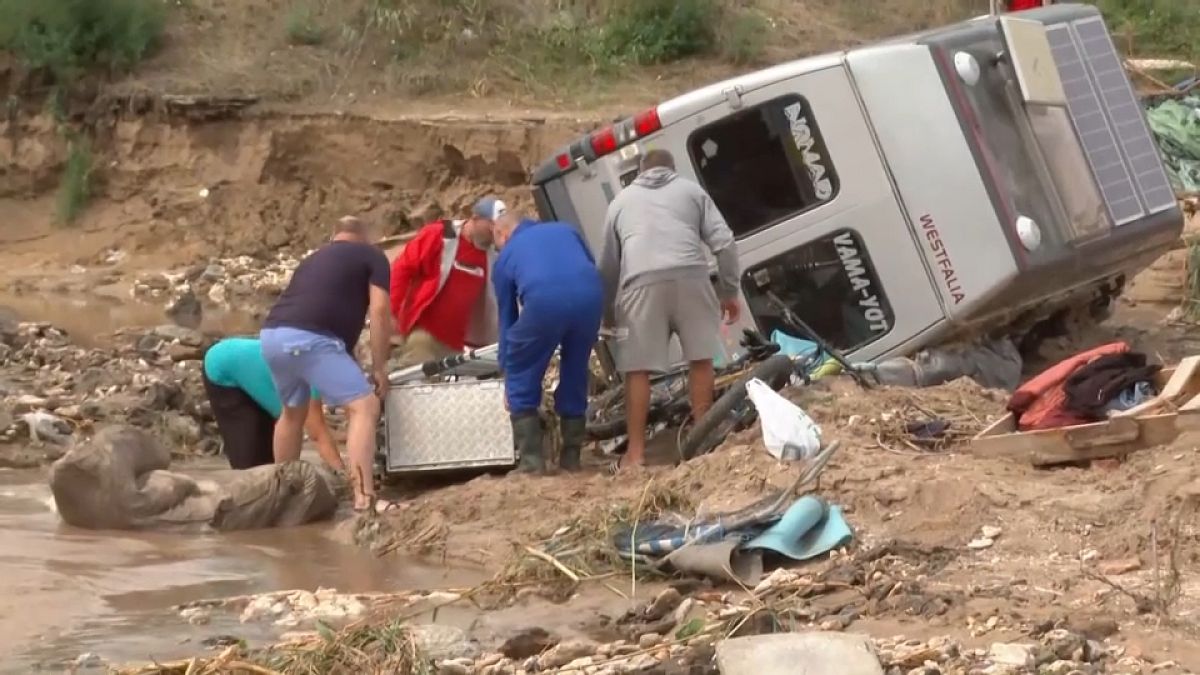Maryland
Maryland man who received second pig heart transplant dies, hospital says

FILE – In this photo provided by the University of Maryland School of Medicine, Lawrence Faucette sits with wife, Ann, in the school’s hospital in Baltimore, Md., in September 2023, before receiving a pig heart transplant. Lawrence Faucette, the second person to receive a transplanted heart from a pig has died, nearly six weeks after the highly experimental surgery, his doctors announced Tuesday, Oct. 31, 2023. (Mark Teske/University of Maryland School of Medicine via AP, File)
WASHINGTON — The second person to receive a transplanted heart from a pig has died, nearly six weeks after the highly experimental surgery, his Maryland doctors announced Tuesday.
Lawrence Faucette, 58, was dying from heart failure and ineligible for a traditional heart transplant when he received the genetically modified pig heart on Sept. 20.
According to the University of Maryland School of Medicine, the heart had seemed healthy for the first month but began showing signs of rejection in recent days. Faucette died Monday.
In a statement released by the hospital, Faucette’s wife, Ann, said her husband “knew his time with us was short and this was his last chance to do for others. He never imagined he would survive as long as he did.”
The Maryland team last year performed the world’s first transplant of a heart from a genetically altered pig into another dying man. David Bennett survived two months before that heart failed, for reasons that aren’t completely clear although signs of a pig virus later were found inside the organ. Lessons from that first experiment led to changes, including better virus testing, before the second attempt.
“Mr. Faucette’s last wish was for us to make the most of what we have learned from our experience,” Dr. Bartley Griffith, the surgeon who led the transplant at the University of Maryland Medical Center, said in a statement.
READ: Surgeons perform second pig heart transplant, trying to save a dying man
Attempts at animal-to-human organ transplants — called xenotransplants — have failed for decades, as people’s immune systems immediately destroyed the foreign tissue. Now scientists are trying again using pigs genetically modified to make their organs more humanlike.
Faucette, a Navy veteran and father of two from Frederick, Maryland, had been turned down for a traditional heart transplant because of other health problems when he came to the Maryland hospital, out of options and expressing a wish to spend a little more time with his family.
In mid-October, the hospital said Faucette had been able to stand and released video showing him working hard in physical therapy to regain the strength needed to attempt walking.
Cardiac xenotransplant chief Dr. Muhammad Mohiuddin said the team will analyze what happened with the heart as they continue studying pig organs.
Many scientists hope xenotransplants one day could compensate for the huge shortage of human organ donations. More than 100,000 people are on the nation’s list for a transplant, most awaiting kidneys, and thousands will die waiting.
A handful of scientific teams have tested pig kidneys and hearts in monkeys and in donated human bodies, hoping to learn enough for the Food and Drug Administration to allow formal xenotransplant studies.
RELATED STORIES
‘Historic’: US surgeons successfully implant pig heart in human
First pig heart transplant patient dies after two months

Maryland
Fall chill overnight for Maryland

Watch CBS News
Be the first to know
Get browser notifications for breaking news, live events, and exclusive reporting.
Maryland
3 Takeaways from the Spartans’ Victory over Maryland

The Michigan State Spartans under head coach Jonathan Smith are 2-0 thanks to a road win against a tough Maryland team, 27-24.
Resilience might be the word to describe this squad so far. The Spartans made some big blunders against the Terrapins and still found a way to battle back. The gritty performance might have been enough to get the Spartans into a bowl game.
Here are three takeaways from the Spartans’ win.
Aidan Chiles: Very Young, Very Talented
Chiles looked vastly improved from the home opener against Florida Atlantic. Again, he looked like an 18-year-old quarterback.
Chiles got not just his first passing touchdown as a Spartan, but three passing touchdowns to go with 24 of 39 passing and 363 yards. He also had three interceptions, which very nearly cost the Spartans the game.
Chiles has about as strong an arm as any quarterback to wear the green and white in recent memory. He is dangerous when he is on the move.
Perhaps a critique is that he should try to make more plays with his legs, he has seemed cautious to these first two games. The first pass rusher to get to Chiles likely won’t bring him down — Chiles has a great feel for the pocket and he is quite slippery.
Chiles overcame some poor mistakes and throwing mechanics (his feet tend to get wide and it factors into his overthrows) to lead the Spartans in the most critical of situations against a sturdy Maryland defense.
Huge game for Chiles, who showed why the hype was so promising.
Can the Spartans Stay Healthy on Defense?
Already, this Spartans squad is beaten up. Dillon Tatum, a key defensive back, lost for the season. Wide receiver Alante Brown, whose injury allowed for Nick Marsh to announce himself to the world, lost for the foreseeable future. Kristian Phillips at guard was huge.
During the Maryland game, several Spartans were beat up. Few even had to go into the tent on the sideline. It will be crucial for the Spartans to remain healthy, especially on defense. Most especially in the defensive backfield.
The Spartans are very confident in their young defensive backs — Justin Denson Jr., Andrew Brinson IV, and Jaylen Thompson can all be very good players, but they need more time to develop.
If more Spartans fall to injury, the defensive backfield could get very young.
Nick Marsh is the Real Deal
Marsh was the recruiting gem of 2024, the best player in a class with plenty of good talent. A highly-rated four-star, Marsh was the No. 107-ranked player in the class by 247Sports. Marsh, of course, stood out in fall camp like the high-profile recruit he was.
6-foot-3, 208 pounds, Marsh already had a man’s body. At just 18 years old.
“Possesses the size, athleticism, and multi-sport profile that projects very well in the long term,” 247Sports’ Gabe Brooks wrote. “Traitsy mismatch wideout with high-major impact potential and the ceiling to develop into an NFL Draft candidate.”
With the loss of Brown, Marsh was asked to step up. Step up he did — eight receptions for 194 receiving yards and a touchdown. Wide receivers coach Courtney Hawkins might have his next in the line of Jalen Nailor, Jayden Reed and Keon Coleman.
Don’t forget to follow the official Spartan Nation Page on Facebook Spartan Nation WHEN YOU CLICK RIGHT HERE, and be a part of our vibrant community group Go Green Go White as well WHEN YOU CLICK RIGHT HERE.
Maryland
Maryland, D.C. and Virginia get more money for house calls for moms and infants – WTOP News

The U.S. Health Resources and Services Administration will provide an additional $23.1 million in federal aid to the agency’s national Home Visiting Program in the District, Maryland and Virginia.
More money is on the way for a home-visiting health care program designed to provide better care for pregnant women, new parents and infants.
The U.S. Health Resources and Services Administration (HRSA) announced an additional $23.1 million in federal aid to the agency’s national Home Visiting Program in the District, Maryland and Virginia.
The extra money is the first time in a decade that the program has received an increase in federal funds, HRSA administrator Carol Johnson said.
“What those resources mean is that we’re able to support nurses, social workers and trained home visitors, and help with those early days of being a new parent,” Johnson said. “All of this has been shown to really make a difference in kids’ outcomes. Kids are so much stronger because they get these kinds of supports.”
Johnson said the program’s success hinges on convenient health visits in a comfortable at-home setting.
“When you’re a new parent, if you have to take off from work and take a few buses to get to an appointment, you’re probably not going to do it,” she said. “But if that person comes to your house and they’re full of resources and knowledge, it’s going to make a huge difference to you.”
Rockville, Maryland-based HRSA spearheads the national program, teaming up with local health organizations to target and reach parents.
Home health care workers can provide breastfeeding support, safe sleep tips and developmental screening for babies. They can even help parents find key services like affordable child care or job and educational opportunities.
“It’s changed my life,” past program participant Fatima Ray said.
Ray said she was introduced to the program in 2015 when she needed help with her infant daughter. She and her husband were first-time parents and stumbled through the first few months with a newborn.
“It felt good, like I had someone on my team,” Ray said. “Those questions you forget to ask the doctor sometimes, she would answer them.”
The experience impressed Ray so much that she became a home health visitor. She is the maternal health coordinator at Primo Center, a homeless shelter for families in Chicago.
“The same care that was given to me, I just want to pass it on,” Ray told WTOP. “I know how much it made a difference in my life. Home visiting matters.”
President Joseph Biden signed bipartisan legislation in 2022 that doubles funding for the program over five years. The move was part of a campaign promise to lower risks linked to pregnancy and improve maternal health, especially among women in rural, tribal and low-income communities.
The national home visiting program will receive $440 million Maryland’s local programs will get $10 million of those funds. Virginia is slated to receive $11 million and D.C.’s home visiting programs will see a $2.5 million increase.
“This will push home visiting forward a lot more,” Ray said. “It’s just going to help tremendously.”
Get breaking news and daily headlines delivered to your email inbox by signing up here.
© 2024 WTOP. All Rights Reserved. This website is not intended for users located within the European Economic Area.
-

 Politics1 week ago
Politics1 week agoTrump impersonates Elon Musk talking about rockets: ‘I’m doing a new stainless steel hub’
-

 World1 week ago
World1 week agoBrussels, my love? Is France becoming the sick man of Europe?
-

 Politics1 week ago
Politics1 week agoTrump campaign slams Harris as 'still a San Francisco radical' after CNN interview
-

 Politics1 week ago
Politics1 week agoHarris says no regrets about defending Biden fitness for office
-

 World1 week ago
World1 week agoLocals survey damage after flooding in eastern Romania
-

 World1 week ago
World1 week agoWhy is Belgium struggling to name a European Commissioner?
-
:max_bytes(150000):strip_icc():focal(722x354:724x356)/Angelina-jolie-becomes-maria-callas-100923-01-2cce48d3de044c459234fd2c2ef1e0d7.jpg)
:max_bytes(150000):strip_icc():focal(722x354:724x356)/Angelina-jolie-becomes-maria-callas-100923-01-2cce48d3de044c459234fd2c2ef1e0d7.jpg) Movie Reviews1 week ago
Movie Reviews1 week ago'Maria' Reviews: What Critics Are Saying About Angelina Jolie's Transformation and Singing as the Opera Diva
-

 World7 days ago
World7 days agoTaiwan court orders release of ex-Taipei mayor arrested in corruption probe

















